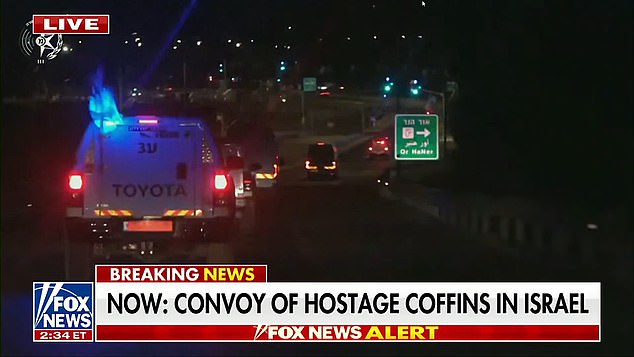A somber scene unfolded as a convoy carrying four Israeli coffins crossed back into Israel from Gaza.
The bodies were escorted by armored vehicles adorned with the Star of David, heading toward the National Institute for Forensic Medicine in Tel Aviv.
This poignant moment came shortly after Hamas released 20 living hostages, marking the first stage of a historic peace initiative orchestrated by former U.S. President Donald Trump.
Before the release of these hostages, reports indicated that Hamas was holding the remains of 28 captives who had died since October 7, 2023, highlighting the immense human cost of the ongoing conflict.
Trump Meets Families and Hails Historic Truce
Earlier, Trump met with families of hostages at Israel’s Knesset, praising the truce between Israel and Hamas.
Speaking to lawmakers, he described the moment as unprecedented and hailed the agreement as a milestone for peace in the region.
He then traveled to Egypt to witness the formal signing of the ceasefire alongside international leaders, including British Prime Minister Keir Starmer, French President Emmanuel Macron, German Chancellor Friedrich Merz, and leaders from Gulf nations such as Qatar and the UAE.
Palestinian Authority President Mahmoud Abbas was also present.
Notably absent were representatives from Hamas and Israel, with Israeli Prime Minister Benjamin Netanyahu declining to attend due to a Jewish holiday.
A Turning Point for the Region
Trump described the signing as a culmination of centuries of hope for peace.
“This took 3,000 years to get to this point. And it’s going to hold up,” he remarked.
The agreement was also endorsed by Egyptian President Abdel Fattah el-Sissi, Turkish President Recep Tayyip Erdogan, and Qatari Emir Tamim bin Hamad Al Thani.
In Israel’s parliament, Trump emphasized that the ceasefire could mark the official end to decades of conflict between Israel and Gaza.
“Now it is time to translate these victories against terrorists on the battlefield into the ultimate prize of peace and prosperity for the entire Middle East,” he stated, urging Palestinians to abandon violence and embrace reconstruction.
Promises for Gaza and Regional Cooperation
Trump also addressed the broader region, including Iran, by extending a message of cooperation.
Despite earlier military tensions, he called for renewed engagement and reconstruction efforts in Gaza, promising U.S. support for humanitarian aid and infrastructure rebuilding.
He described Gaza’s current state as devastated, saying, “It’s blasted. This is like a demolition site,” yet expressed hope for eventual redevelopment.
Plans for postwar governance, reconstruction, and Hamas disarmament remain unresolved, leaving the peace fragile.
International Support and Implementation
Under the first phase of the ceasefire, Hamas will release the remaining hostages, Israel will release hundreds of Palestinian prisoners, humanitarian aid will flow into Gaza, and Israeli forces will partially withdraw from key cities.
Approximately 200 U.S. troops, along with partner nations, NGOs, and private-sector actors, will help monitor and support the ceasefire.
The deal also includes reopening five border crossings to facilitate essential supplies into Gaza, where residents continue to face dire conditions.
Trump and international partners hope these measures will provide immediate relief while laying the groundwork for longer-term peace and rebuilding.
A Fragile Yet Hopeful Future
While the ceasefire represents a critical first step, challenges remain.
Negotiations over Gaza’s governance, the disarmament of Hamas, and the territory’s reconstruction could face setbacks.
Israel has indicated that military action could resume if conditions are not met.
Still, the moment brought hope to millions, with families of hostages and Israeli citizens alike expressing gratitude.
For now, the region watches closely, hoping that this historic initiative will lead to lasting peace.
Share on Facebook «||» Share on Twitter «||» Share on Reddit «||» Share on LinkedIn
